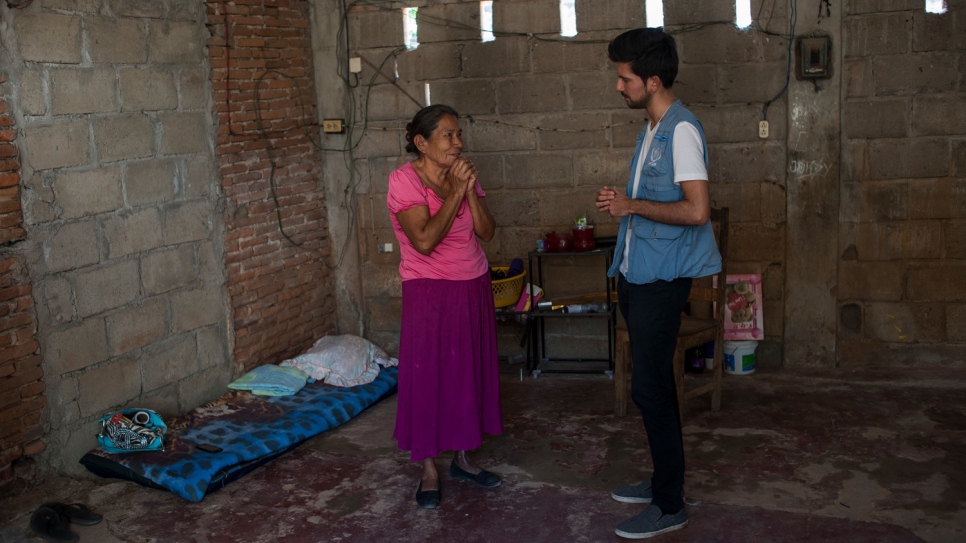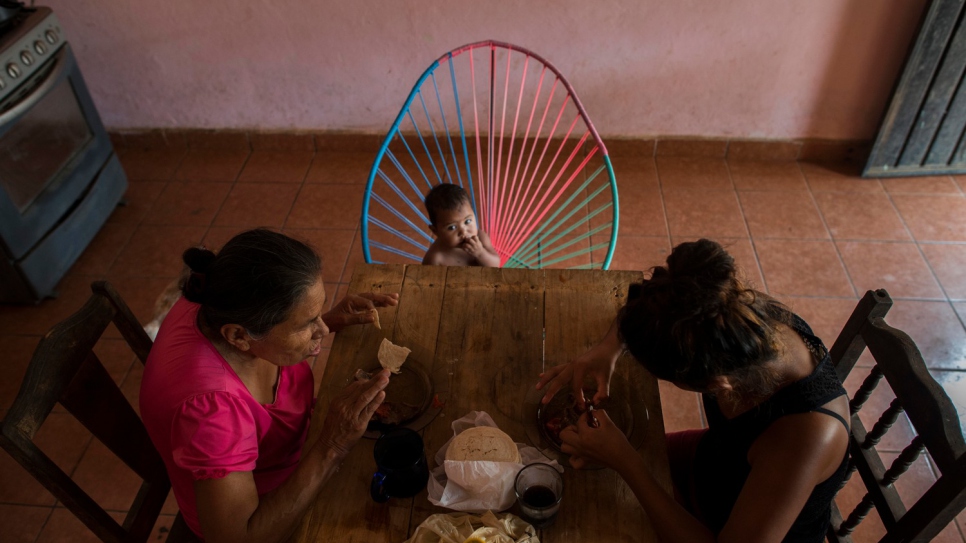Elderly and on the run from El Salvador's street gangs
Threatened by murderous street gangs, Margarita Ramirez* fled for Mexico where she is starting over at 72.
Margarita Ramirez, a refugee from El Salvador, in her new home in Mexico.
© UNHCR/Daniele Volpe
Margarita Ramirez* knew who it was when she heard the loud thuds on her front door. She opened it a crack and saw several members of the Barrio 18 street gang which ruled her neighbourhood.
“Where’s your son?” one asked calmly.
Margarita, who made a living selling bread from a small street stand in her hometown in western El Salvador, recognized many of the gangsters who came to her door that night. She had maintained a tenuous peace with them for years, giving the young men bread to stay in their good graces.
But that all changed when the gang began shaking down her 37-year-old son, Jose, the owner of a small convenience store. He had failed to keep up with the “war tax” they demanded and was now hiding in her house
“My son? I don’t know. He’s not here,” Margarita responded coolly.
Jose quietly ran into the back room, hopped out a window, and sprinted down the alleyway. He left the neighbourhood and did not come back.
“I was standing there lying to them, but I just asked God to give me strength even though my heart was going ‘Thump, thump, thump,’” she says, pounding her chest.
Her deception worked. But the next day they were back with a threat: “You either hand him over or we’ll get rid of you to get back at him.”
That was the breaking point. Margarita knew she had to leave. With just a small bag of clothes, the 72-year-old left before dawn, headed to the nearest bus station and left El Salvador for good. By that night, she was at a river marking the Mexico-Guatemala border, which she crossed on a makeshift raft.
“I didn’t know anything about Mexico when I came here,” she says. “I didn’t know anyone. I didn’t know I’d have to cross a river. I knew nothing!”
A growing number of men, women and children are fleeing the street gangs or maras, whose reach extends throughout El Salvador, Guatemala and Honduras, where they commit crimes ranging from drug dealing, extortion and robbery to rape and murder.
Among those seeking asylum in Mexico from the so-called Northern Triangle countries of Central America are more and more elderly people like Margarita, who face distinct challenges.
“Starting from scratch in a new country is difficult, but it can be particularly difficult for elderly refugees,” says Mark Manly, UNHCR’s representative in Mexico. “Many are pillars of their family and the community but others face particular problems because of illness or the wear-and-tear of old age.”
Since reaching Mexico in mid-2016, Margarita has been granted refugee status and is now a Mexican resident. Through financial support from UNHCR, the UN Refugee Agency, she has been able to pay rent and get groceries from a food bank.
“I saw people my age just fall over and die in El Salvador. You live under so much stress all the time,” she says, noting the new lease on life that a fresh start in southern Mexico has given her. “At 72, I feel young!”
While simple, her small, one-room house – with a slim mattress, a bedside lamp, and a small dresser - is nevertheless homely.
To keep herself busy, she helps out with child care for a young couple and their one-year-old daughter who live next door. She has also found part-time work as a housekeeper for another family nearby, which gives her enough income to get by, and she one day dreams of having a stall in the local market.
Meanwhile, Margarita is striving for something she did not have the chance to do in El Salvador: study. She left school at the age of eight but is now getting back into the classroom 64 years later.
“I don’t know how to read much – only my bible – and I can’t write,” she says. “And I want to learn, now that the opportunity is in front of me!”
Through a programme started by UNHCR and Mexico’s Secretariat of Public Education, Margarita and several other refugees who have missed out on schooling are studying two days a week to receive a primary school certificate.
As the first class begins, Margarita – decades older than anyone else in the class – stands first to introduce herself.
“I am so grateful to be here,” she says. “We all have a great opportunity and I am so inspired seeing all the people who have come here and chosen to learn.”
*Name changed for protection reasons.





